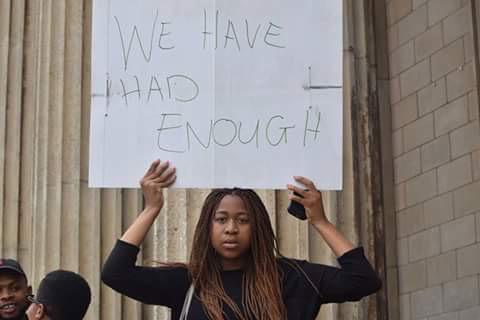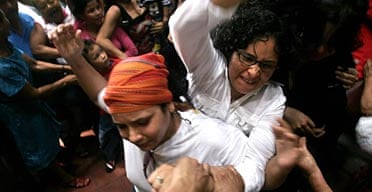
The #RhodesMustFall, #FeesMustFall and #EndOutsourcing movements are noteworthy for having “a fairly well-defined ideology and view of history, which could be described as Black Consciousness combined with anti-imperialism, feminism and, to a lesser degree, socialism.” Of particular interest to many is the feminist leadership and core of these movements. When Africa Is a Country compiled an eleven minute video on #FeesMustFall, whom did they interview? Women: Malaika wa Azania, Khanyisa Nomoyi, Ntombikizhona Valela, Julie Nxadi, Siyamthanda Nyulu, Lithle Asante Ngcobozi. For the entire film, the discussion of #FeesMustFall and of the national shut down is conducted and led by women. This has been a feminist uprising, from leadership personnel to strategy to implementation.
One sign of this feminist impulse is the insistence of women within the movement to challenge the decision making and discursive practices of the movement itself, and to do so openly, publically and positively. Daily Vox reporter Pontsho Pilane wrote about what she saw at Wits, “The way female student leaders were systematically ignored, sidelined and silenced during the #FeesMustFall movement suggests that once fees have fallen, the next big issue that needs attention is our attitude towards women … I don’t know what is worse, experiencing overt sexism or just being systematically sidelined by the already patriarchal political environment. Either way, I think it is time that we seriously talk about the erasure and silencing of black women in this student movement and many others like it. Those who believe that black women will put their womanhood at the altar of sacrifice in the name of the “collective struggle” are blinded by their male privilege and will indeed feel like this is an attack on their person. Black women calling out the patriarchy and misogyny within the movement is not an attack, it is a protection of their humanity – including their blackness and womanhood – in its entirety.”
Kagure Mugo, a recent UCT alum, saw the same: “We are living in a South Africa that tried to build itself without young people, without women and too a large extent without the so-called `previously disadvantaged people’, because of the nature of hierarchy within the struggle system, and now we are here. This grading of the suitability of leaders based on age and gender within movements is what has landed us in this position where #FeesMustFall is a national issue, #Marikana is a part of reality, and we still desperately need #16DaysOfAcitvism all year round. We forgot about young people, the worker and women once certain men reached the top. Intersectionality is not an expensive word, it is integral to building up a people because no-one is simply one thing.”
The names of women leaders in this movement keep on keeping on: student leaders like Shaeera Kalla, Nompendulo Mkatshwa, Jodi Williams, Alex Hotz; outsourced workers like Moedie Motlanke, Cathy Sepahela, Zelda Mohamed; and reporters like Pontsho Pilani and Ra’eesa Pather all attest to the centrality of intersectionality in this movement.
As Camalita Naicker, a student at the University called Rhodes, wrote, “There has been an insistence from the beginning that any struggle for decolonisation must be intersectional and recognise not only the role played by women, but that transformation must have gender relations as central tenet. The constant feminist backlash has kept many movements from collapsing into reliance on patriarchal or misogynist leaders and leadership styles even if this is an on-going battle. Perhaps even more inspiring has been the fidelity to principles and values that foreground the collective spirit and decision-making practices of these movements. Rejecting and resisting co-optation or the tendency of management to divide and rule by attempting to single out student leaders and have private meetings, while remaining disciplined has proved their maturity and intellect time and time again.”
#FeesMustFall #FeesHaveFallen #RhodesMustFall #RhodesHasFallen #PatriarchyMustFall The feminist future of #PatriarchyMustFall is now! Viva!
(Photo Credit: zelamartin.com)
